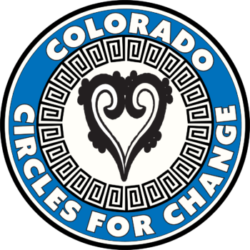History
The summer of 1993 gained notoriety as the “Summer of Violence” or “Summer of Fear” in Denver, Colorado, as the state’s capital and largest metropolitan area witnessed 74 homicides. The number of crimes linked to gangs included 6 homicides, 142 aggravated assaults, 29 simple assaults, and 18 robberies. Additionally, some 58 juveniles were treated for gunshot or stab wounds at Denver Health Medical Center (then the Denver General Hospital) one block north of the First Mennonite Church of Denver where CCFC is currently housed. Nearly one out of every four murder suspects arrested in Denver was a juvenile male of color. Colorado ranked tenth in the nation for violent juvenile crime, most of that crime was among youth of color. In response to this violence and the police response that ensued, a small group of interested members of the First Mennonite Church of Denver led by Senior Pastor Jerry Weaver came together to determine what could be done to forestall another “Summer of Violence”. This group acknowledged that specific societal forms of oppression such as racism and poverty contributed to the violence communities of color were experiencing and wanted to create an organization whose values were rooted in social justice, non-violent conflict resolution, intentional anti-racist approaches and was community led.
This group also recognized that in addition to the violence being seen in the inner city of Denver there was also an increase of racial profiling by police, police harassment and incarceration among youth of color. The “temporary board of directors” researched national programs that would support their vision of ending violence while providing alternatives to incarceration for youth and felt their vision aligned with the principles of restorative justice. While CCFC of Denver intended to serve the larger Denver metropolitan area, at the beginning it planned to target the community around the First Mennonite Church of Denver at 430 West 9th Avenue which provided the program with pro bono office space, mediation rooms, and training facilities as well as financial support and numerous volunteers. The community, generally known as the La Alma-Lincoln Park neighborhood on Denver’s West side, was the second poorest in the city, after 22 years CCFC continues to be housed there and rooted in one of Denver’s poorest communities. This group continued to meet and by 1995 launched their first program based in the principals of restorative justice which they believed provided systematic change to the criminal justice system by providing an alternative to incarceration for youth of color. Recently CCFC staff and youth leaders have engaged in a variety of trainings focused on making systemic change in the juvenile justice system which has led to a transition from restorative justice to transformative justice which puts an emphasis of not only diverting youth out of the system with restorative justice services but also employs strategies to make positive systemic change.
For the past 25 years CCFC has provided an array of programs to support youth and their families, and as community needs have changed CCFC has responded by ensuring programs are community led and supporting youth in dismantling violence, staying out of the juvenile justice system and reaching their full potential.
In 2017 with the Support of the Latino Community Foundation of Colorado, led by feedback from youth, families and community partners, VORP embarked on a strategic plan focused on assessing the evolution of the organization, our programs and youth needs. The results of that assessment led to VORP adopting a name that best speaks to community about the services provided by VORP. Rooted in the foundation of dismantling youth violence, anti-oppression and restorative justice our founders envisioned, we are thrilled to share our evolution to Colorado Circles for Change. The new name specifically speaks to how we use the sacred circle process, and our committed to supporting youth in their personal transformation and our commitment to changing systems that impact the lives of youth of color.
We feel extremely blessed to have such a strong foundation Pastor Weaver and founder left us to build upon and provide the most impactful programs for our youth that dismantle systemic oppression and heal the trauma youth and families experience as a result of those systems
